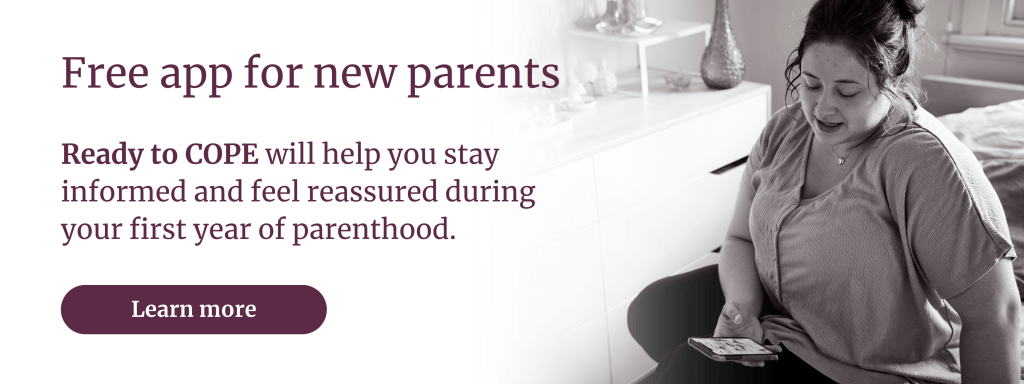Postnatal rage

What is postnatal or postpartum rage?
While people talk about postnatal depression and anxiety and this is often covered in the media, we rarely hear about postnatal or postpartum rage, which may also be experienced- particularly in the months following birth and early years of parenthood.
In some ways, talking about feelings of anger and post partum rage is still taboo, especially during a a time when we feel pressure to only have positive loving feelings towards our children and family members. As a result this can leave mums and dads who report feeling intense, all-consuming rage to also feel guilt and shame. It can also stop parents from speaking out or getting the help they need – rather they suffer in silence.
My rage was awful. I would throw and break things. Shatter dishes, destroy my belongings. I’d punch walls or kick things. Everything set me off.
When can postpartum rage occur?
While it’s unclear just how many mothers and fathers experience postpartum rage due to the fact that it’s often not reported or measured during screening, recent research of new mothers has shown that anger can occur at the same time as postnatal depression.
During what we sometimes call the “fourth trimester”, postpartum frustration or anger can be directed towards children, family members (usually our partners!) and at ourselves. Understandably, this can have a negative effect on our relationships. It can also negatively impact our experience and enjoyment of parenthood.
Postpartum rage can be scary, overwhelming and cause a significant amount of guilt and shame. Some mothers may feel guilty for getting angry with their baby, or for experiencing postpartum resentment towards their husband.
Many mothers describe postpartum rage as coming from nowhere, and feeling shaken and upset afterwards. Episodes can also reinforce feelings of failure or not living up to societies ideal of the “perfect mother.” While sleep-deprivation and hormonal fluctuations can test even the most patient amongst us, feelings of powerlessness, a mismatch between what we expected motherhood to be like and the reality, as well not having enough support from partners, family and even health professionals, can all contribute to intense feelings of rage.
How could I yell at people I love? What kind of mother yells at a child? A little child? What will they remember of me when they grow up? Why am I still so angry? But then I went to a therapist … and I told her how horrible I was … how angry I was … and she told me, ‘You’re not angry. You’re scared’.
COPE Ambassador Laura Mazza
Symptoms of postnatal rage
Symptoms of postnatal rage may include:
- Screaming or swearing more often
- Difficulty controlling your temper
- Physical expression of anger such as punching or throwing things
- Experiencing violent thoughts or urges
- Feeling a flood of emotions afterwards, including shame
How to cope with postpartum rage
Here are some helpful strategies that may help you cope with postpartum rage:
Remember that you’re not alone
Rage can be a common part of early motherhood. This is particularly so when you’re sleep-deprived and coping with the challenge of the transition to parenthood.
It’s okay to have feelings
It’s okay for our children to see that we have feelings, to see that we’re human, and that we can “lose it” at times. It gives them permission to do the same.
Recognise triggers
Have a think about your triggers and consider journaling to keep track of what can set you off. Understanding these patterns can to help determine where you might need additional support.
Breathe
Try to slow your breathing. Breathe in for two seconds and breathe out for four seconds. Repeat until your heart rate slows down.
Acknowledge other stressors
It’s important not to underestimate the impact of sleep-deprivation and hormonal fluctuations on your ability to cope and on your feelings and emotions.
Set boundaries
While these aspects aren’t often something we can control, things like saying “no” to visitors, lowering our expectations around house work and crossing a few items off our to-do list are some ways to lower feelings of overwhelm.
Take time out
If you can take some time away from your child, do something you find soothing. This may be having a shower, going for a run, listening to music, or calling and speaking to a friend. This will be different for everyone.
Ask for help
It’s important that if your baby’s crying is setting you off, that you ask for your partner or a family/friend to take over while you catch your breath. If this isn’t possible, put your baby down in a safe place, such as their cot, and take five minutes.
Connect with other mums
Connect with others who are at a similar stage of parenthood, either face to face or via our Mama Tribe. It can be helpful finding women who are experiencing similar challenges, and to be able to discuss these in a safe and non-judgmental space.
Download Ready to COPE
Get free, timely support and information throughout your pregnancy and first year of motherhood – including tips for managing in the more difficult times. Download the free app, Ready to COPE
Viewing this on a PC? Scan the QR code with any phone to download Ready to COPE.

If you’re concerned about feelings of anger, speak to your doctor or health professional. It’s possible you may be experiencing parental burnout, postnatal depression and/or anxiety so it’s important to be assessed for these conditions and referred to appropriate support and treatment.
Ultimately, it took a long time, I finally managed to get in to see my wonderful GP, who had a big, deep chat with me and said, you know, I think underneath all of this, there might be some depression which had never been flagged because we don’t tend to screen for anger when we screen for depression disorders.
Kaitlyn
You’re not alone, and help is available.

